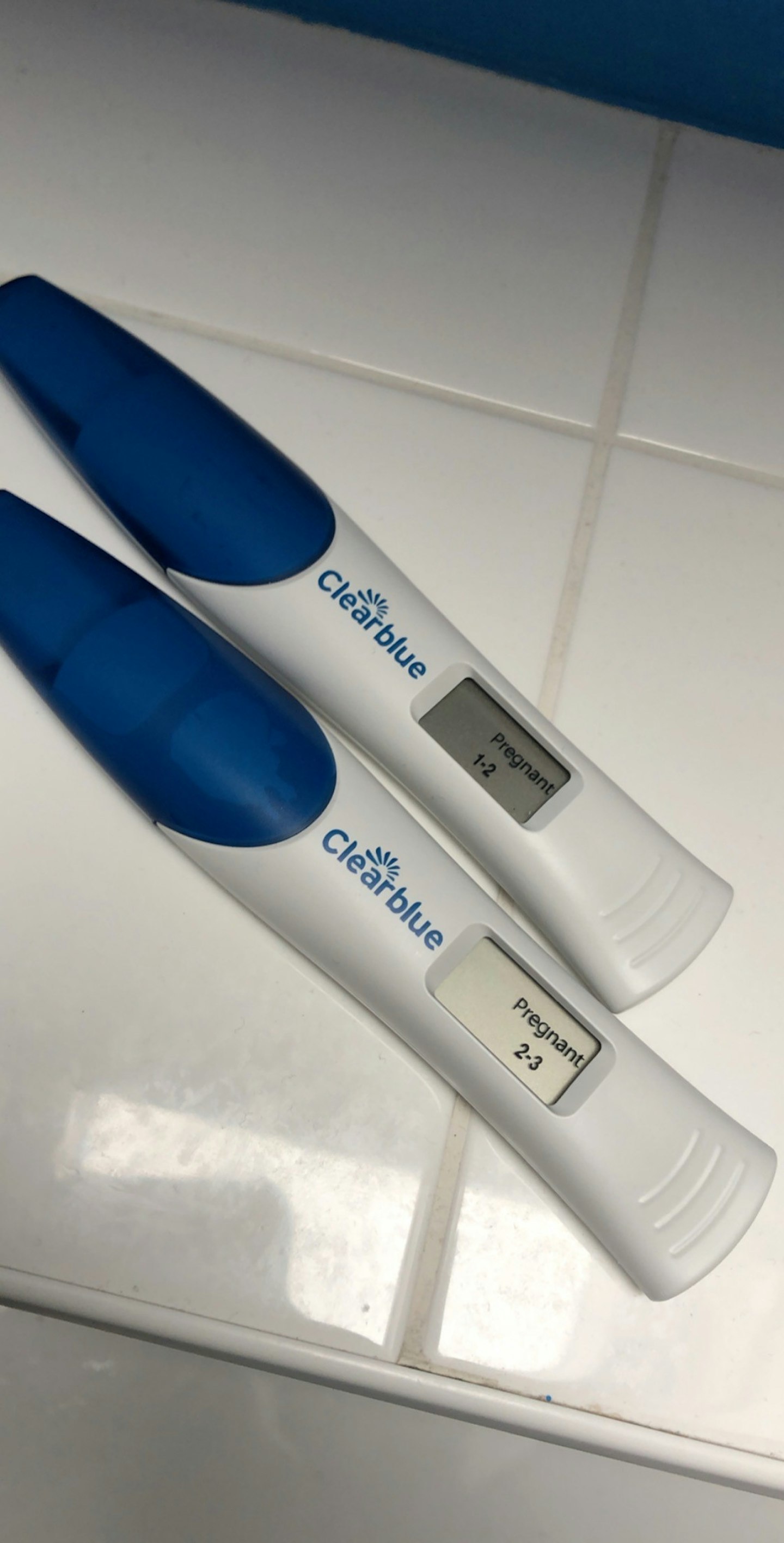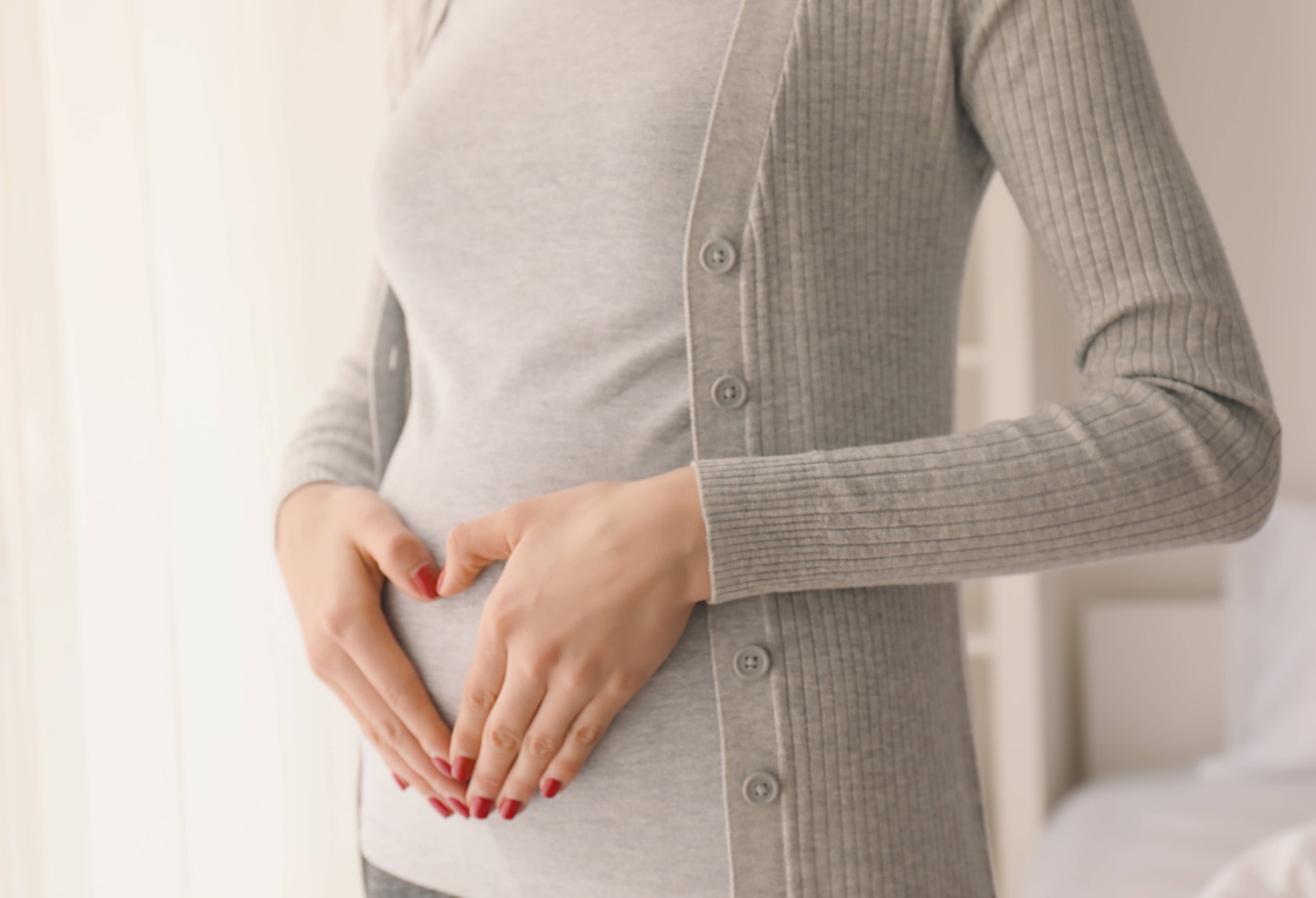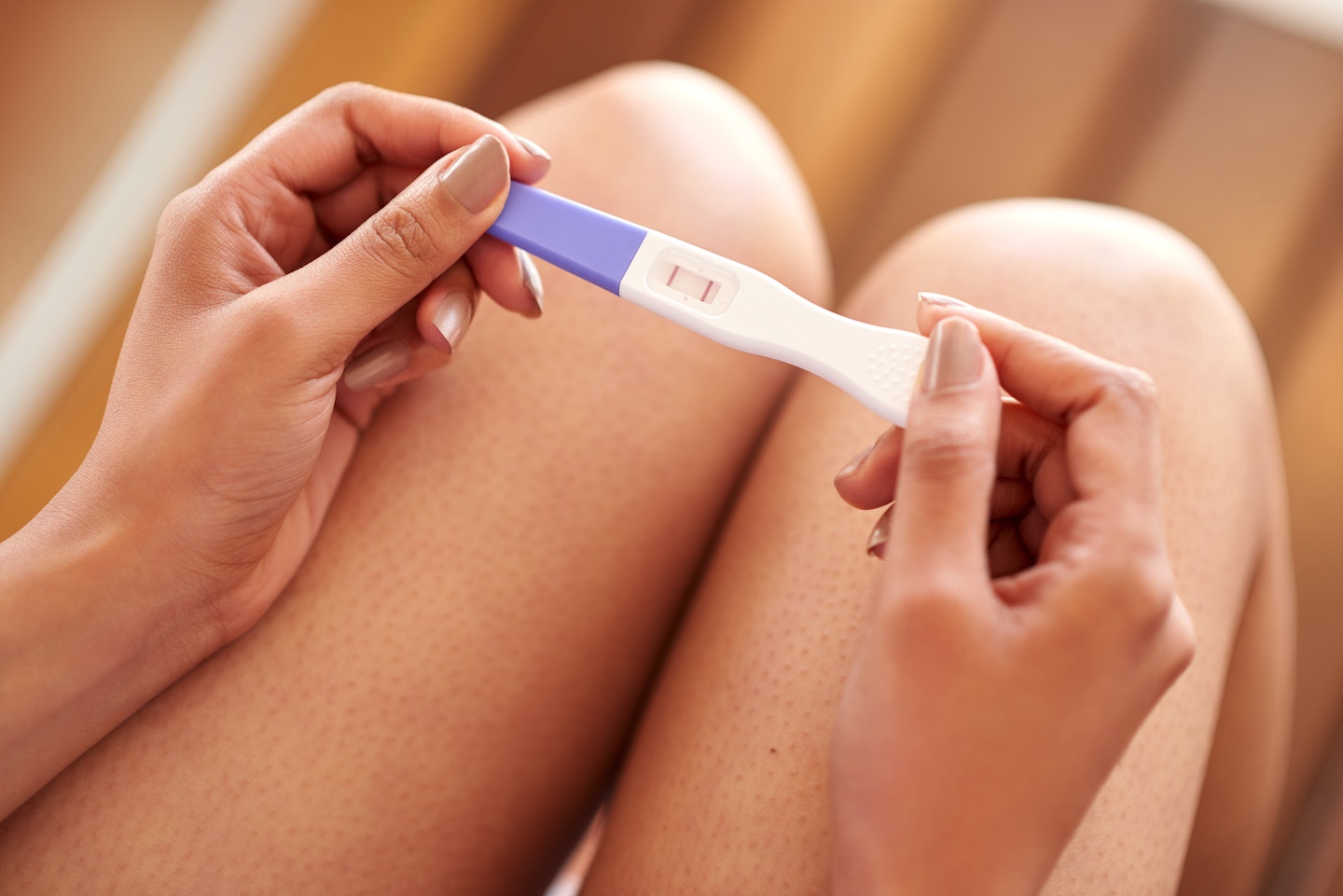Reviewed by Lesley Gilchrist, registered midwife and co-founder of My Expert Midwife
Waiting to take a pregnancy test can feel like torture and while you won't know for sure if you're expecting a baby without one, there are lots of early pregnancy signs to look out for that could mean you could be pregnant. And we're not counting your dog sensing that you're pregnant, sorry!
The NHS suggests waiting at least 3 weeks, after you think you may have conceived before taking a pregnancy test, however, some pregnancy tests can detect pregnancy hormones earlier and your body can start showing early pregnancy signs and symptoms as early as 2 weeks after conception.

After conception, fertilisation and implantation, your body goes into overdrive and the hormones of pregnancy help kickstart the process you are about to follow for the next nine months. You might recognise some of the more obvious signs listed below, but there are subtle changes in your body and mind which might surprise you.
Classic signs and pregnancy symptoms
While some of these symptoms can indicate something else or be a sign of a phantom pregnancy, they could also be a symptom of your early pregnancy.
Missed period
One of the most concrete signs you're expecting is a missed period and according to the NHS, is one of the main reasons your period might stop. That said, if you have irregular or light periods, this can be an easy one to miss. More unusually some women may still have periods after they conceive.
Nausea
Morning sickness is caused by an increase in the pregnancy hormone human chorionic gonadotropin (hCG). For many, this is the first sign of pregnancy. Don’t be misled by its name - 'It can affect you at any time of the day or night, and some women feel sick all day long' according to the NHS.
Tiredness
As your body gears up to start supporting your baby, tiredness and feeling exhausted can start within two weeks of conceiving. Nobody is sure as to what causes fatigue during the early stages of pregnancy, but it’s possible that it’s linked to the increase in the hormone progesterone. Staying hydrated and eating some pregnancy superfoods that are rich in iron can help.
Sore breasts
Due to the rising levels of hormones in your body, your breasts may start to feel tender and become swollen, just like before your period. Your breasts veins may also start to look more visible and your nipples may darken.
Frequent urination
Although your baby won't be pressing on your bladder just yet (a common side effect you'll experience later in your pregnancy), the hormone changes, plus a greater blood volume and your kidneys working harder could mean you find yourself rushing to the toilet more often right now. The NHS say this could affect you more at night.
Increased sense of smell, strange tastes and cravings
Again, those crazy hormonal changes occurring in your body can make you more sensitive to certain odours and your sense of taste may change too. You may find yourself even going off certain foods, craving others and notice a strange metallic taste in your mouth (known as 'dysgeusia'). They can get stronger in your second trimester, and then eventually stop in your third.
Lesley Gilchrist, registered midwife and co-founder of My Expert Midwife says: “The signs and symptoms of pregnancy are predominantly caused by hormonal changes. Every person can experience these differently and they may vary for the same person in different pregnancies.”
Other pregnancy symptoms
Although these symptoms could be down to other things, it may be worth taking a pregnancy test to put your mind at ease if you have any of these symptoms and think you could be pregnant.

Spotting or bleeding
This might sound strange and is another one that can be confused with a period, but around a third of women experience some sort of implantation bleeding. Implantation bleeding is when the foetus implants into the lining of your uterus and causes a small amount of blood. This usually happens six to twelve days after you've conceived.
Spotting in early pregnancy can also be a sign of an ectopic pregnancy, so it's important to talk to a healthcare professional if you're experiencing unforeseen bleeding.
Increased vaginal discharge
You may notice your body is producing more milky white and wet and watery vaginal discharge. This is normal and helps prevent any infections travelling up from the vagina to the womb.
Constipation and wind
It might be an embarrassing symptom you'd rather not talk about, but wind could actually mean your digestive system is adapting to those baby hormones. Constipation can be caused by the hormone progesterone, which makes the digestive system slower and more sluggish. The NHS advise a number of ways mums can help constipation in pregnancy including, eating foods that are high in fibre, such as wholemeal bread and cereals, fruit and vegetables, and pulses such as beans and lentils, exercising regularly to keep your muscles toned, drinking plenty of water and avoiding iron supplements, which can make you constipated.
Heartburn
Many women experience heartburn during the first trimester due to hormonal changes, particularly an increase in progesterone. This hormone relaxes the muscles in the body, including in the oesophagus, which can allow stomach acid to flow back up into the oesophagus, causing the burning sensation known as heartburn.
As pregnancy progresses, heartburn can also be caused by the growing uterus putting pressure on the stomach. It's a common symptom that can continue throughout pregnancy, though it varies from person to person.
Temperature changes
Pregnancy causes an increase in blood volume as your body starts to work harder to support your growing baby, although some women can feel excessively cold too.
Period-like cramps
It's the right time of the month and you have the normal period cramps. But wait, these stomach aches could be a sign you've conceived and the egg has implanted into the uterine wall, causing that familiar cramping sensation%20pains%20or%20cramps,a%20poo%20or%20pass%20wind.){href='https://www.nhs.uk/conditions/pregnancy-and-baby/stomach-pain-abdominal-cramp-pregnant/#:~
The NHS advise, 'they're usually nothing to worry about, but they can sometimes be a sign of something more serious that needs to be checked.'
Feeling lightheaded or fainting
It's thought that the pregnancy hormone progesterone makes your blood vessels relax and widen to increase blood flow around the body, causing low blood pressure. The NHS advise that you might want to check with your GP if you're not sure why you fainted.
More emotional
Have you found yourself weeping on the underground or sobbing at a TV advert you've seen hundreds of times before? Emotions tend to be all over the place during pregnancy (one word - hormones), so if you're on an emotional rollercoaster, it might be time to go and buy a pregnancy test. It's also common to feel extremely grumpy and short tempered. A combination of pregnancy symptoms can wreak havoc with your moods.
According to the NCT, as your hormones and hormone levels change, any mood swings and emotions should wear off.
Bloating
While it's unlikely your pregnancy bump will be showing yet, if that pre-period puffiness hasn't disappeared, it could actually be the pregnancy hormone progesterone at play. Feeling bloated? It might be worth taking a test. According to the NHS, bloating usually affects mums at the 4-week pregnant mark.
Headaches
Many women experience headaches around the time of their menstrual period, due to a surge in the hormone oestrogen. After conception, your oestrogen levels also rise, which could be what's causing that pounding head. Headaches can be common in early pregnancy and usually resolve. Persistent headaches experienced in later pregnancy (after 20 weeks pregnant) should be assessed by your midwife or doctor to exclude other conditions such as pre-eclampsia.
Back pain
If you're already suffering from backache, it could be caused by the pregnancy hormone relaxin, which makes your ligaments and joints relax and become looser, so your body is ready to give birth. The NHS say, 'During pregnancy, the ligaments in your body naturally become softer and stretch to prepare you for labour. This can put a strain on the joints of your lower back and pelvis, which can cause back pain.'

Excessive saliva
Medically referred to as Ptyalism, it's a condition where you make too much saliva. This is another one caused by those early hormonal changes. Ptyalism is common during the first trimester of pregnancy and that you may need to spit out some saliva into a tissue quite often, while the bitter taste of the saliva can cause nausea and vomiting. The good news for most women is that it should ease after the first trimester.
Sex drive
Research by the NCT has uncovered that your sex drive can decrease in early pregnancy. 'Studies have shown a 20% decrease in pregnant women having sex because of their sex drive decreasing.'
This is down to a number of the above symptoms you might be experiencing.
What to do if you suspect you're pregnant?
Whether you’ve got one, a few, or lots of these signs of pregnancy, the best way to find out for sure is a simple pregnancy test.
Some tests are so advanced these days that you can take an early pregnancy test six days before your period is due and expect a result that’s around 99 per cent accurate.
No early pregnancy symptoms?
It’s worth remembering that everyone experiences pregnancy differently, Lesley Gilchrist says: “Some women may not experience any early pregnancy symptoms, and this is OK and can be totally normal too, so don’t worry if you don’t. If you don’t have early symptoms and are unsure if you are pregnant, take a pregnancy test as they are accurate from as soon as you have missed a period.”
I'm pregnant, what next?

Congratulations! If you want to proceed with the pregnancy, it's time to start planning! Work out when your baby should arrive by using our due date calculator and learn more about what to expect by reading through our pregnancy week by week guides.
Lesley says: “You will probably want to book an appointment with your midwife once you have a positive pregnancy test, depending on your area you can do this via your GP, hospital or online. This will be a longer one than usual, as there will be more questions about your health and history being discussed with you. It will also provide you with an opportunity to talk about many topics surrounding pregnancy and birth, as well as the option for having screening and blood tests if you want them.”
About the expert
For this piece we worked with Lesley Gilchrist, registered midwife and co-founder of [My Expert Midwife]{href='https://myexpertmidwife.com/pages/how-to-get-pregnant' target='blank' rel='noreferrer noopener nofollow'}. The company has just launched a not for profit Trying to Conceive kit to support people who are trying to conceive._
Hannah Carroll is our Senior Digital Writer at Mother&Baby. In her capacity, she curates top-notch listicles, crafts insightful how-to guides, and delivers expert product reviews. As a mother of three, Hannah draws upon her comprehensive understanding of all facets of family life to bring true insight into all the products that make running a home easier.
